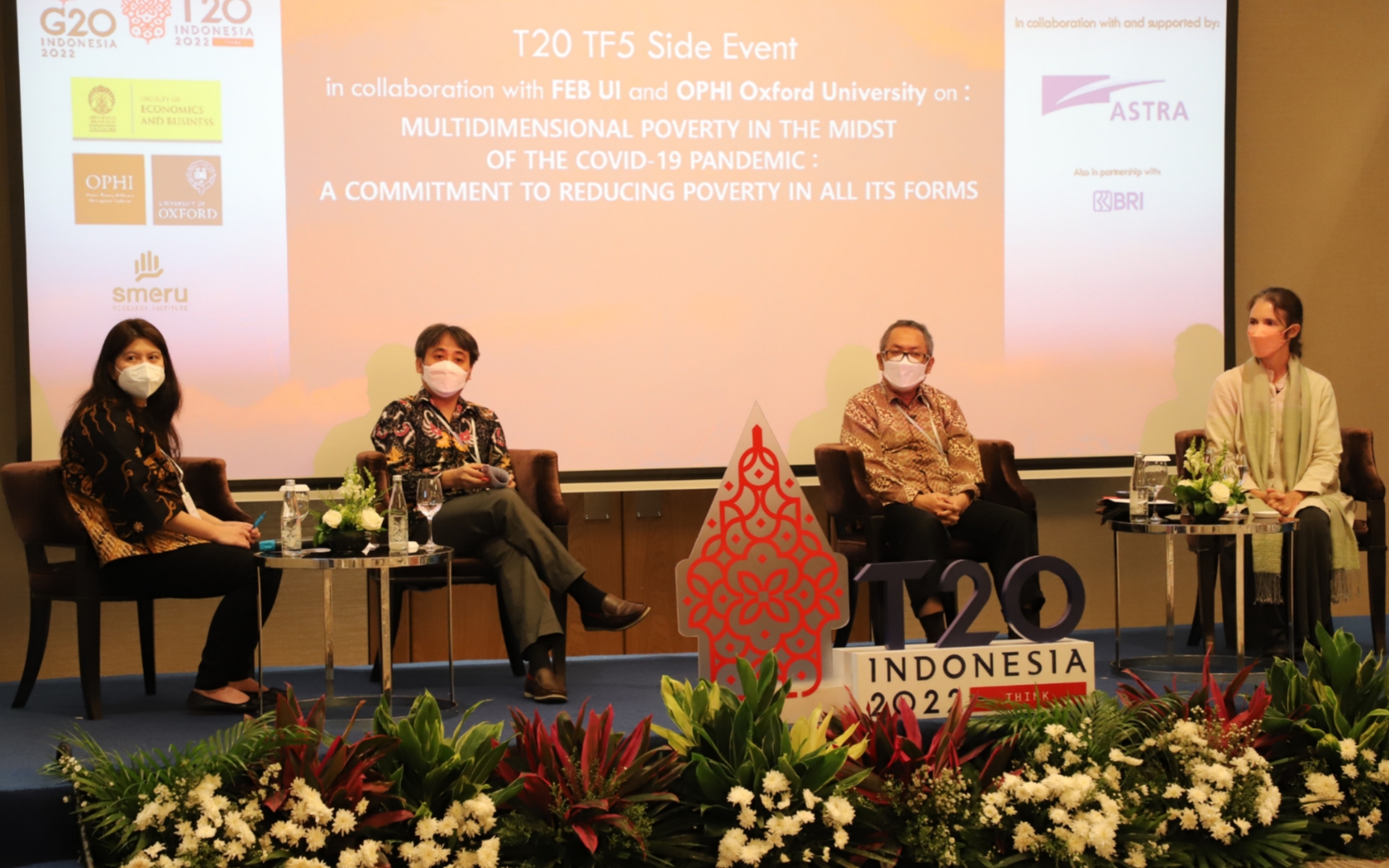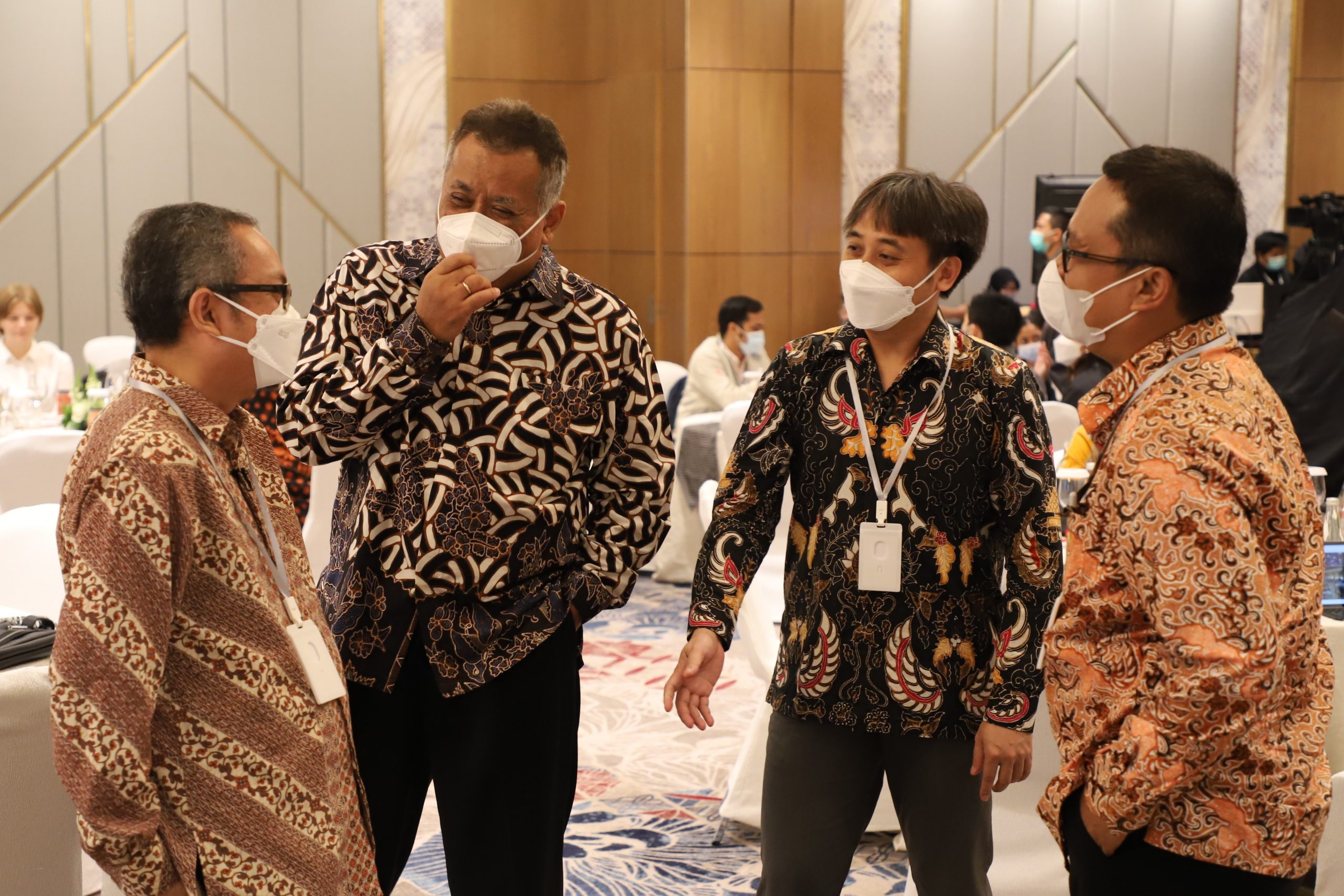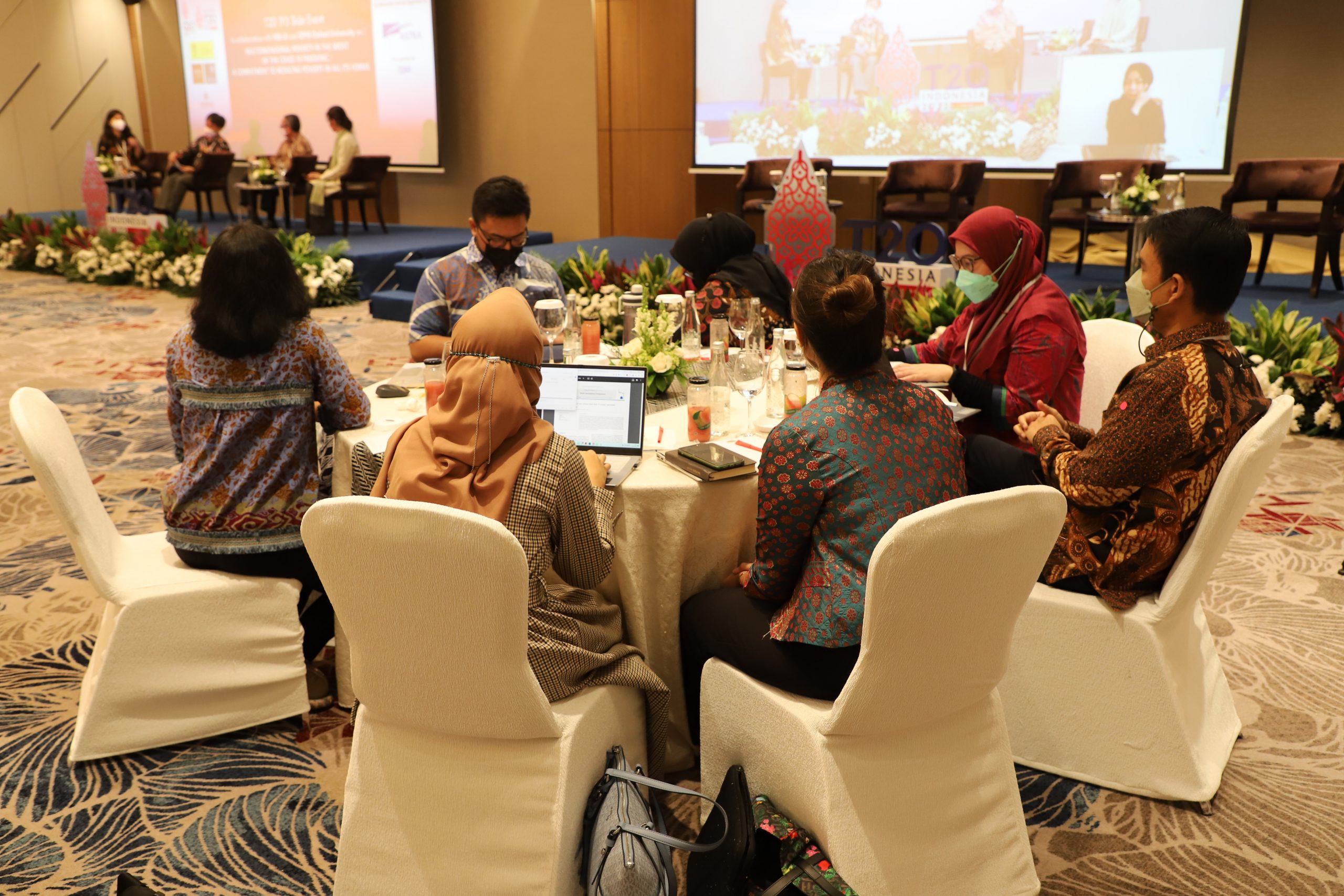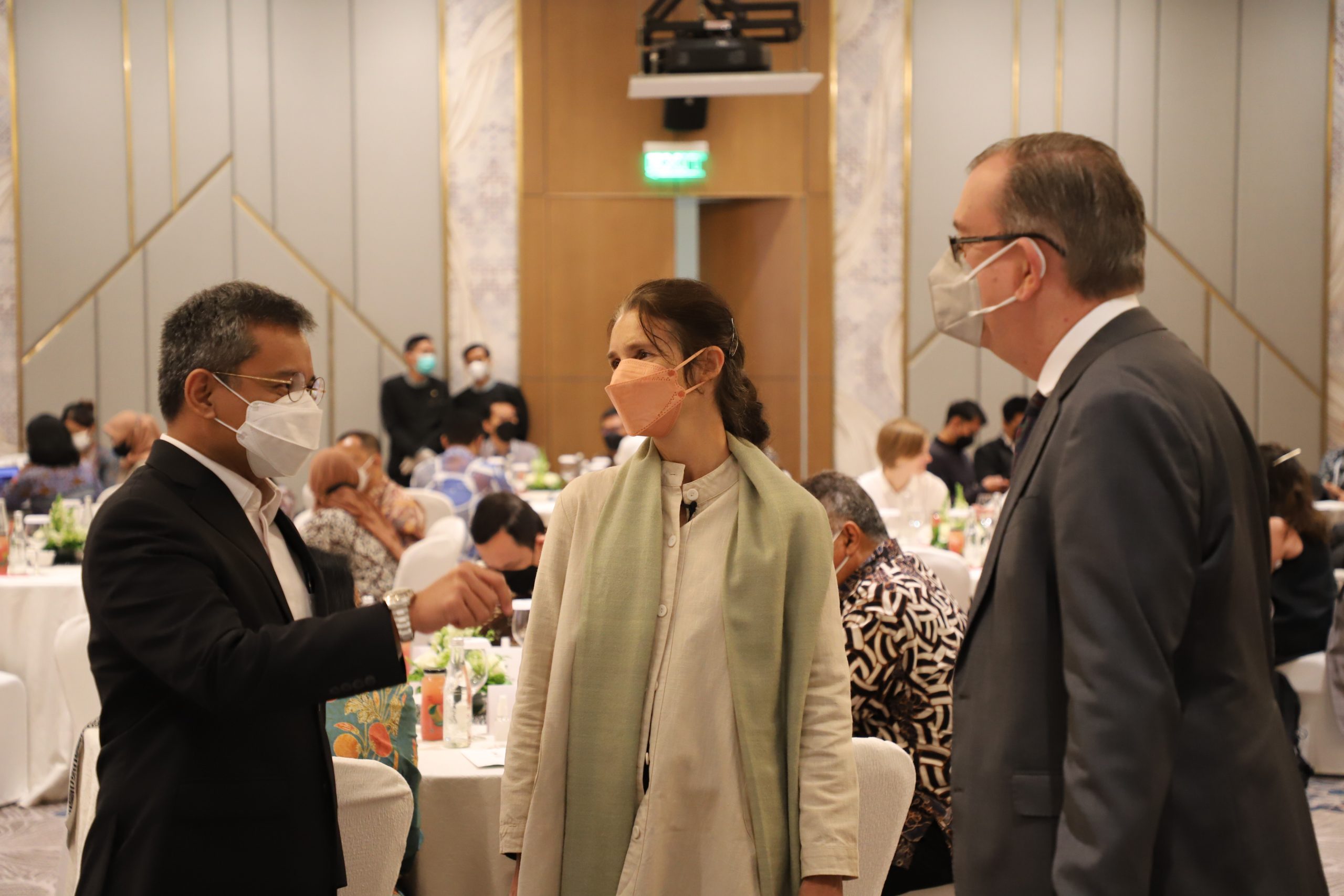FEB UI Together with OPHI and Oxford University, Assess Poverty Alleviation Efforts in All Fields
JAKARTA – (27/7/2022) Think 20 (T20) acts as a “knowledge/idea bank” for the G20. In line with this role, T20 is a forum for experts to present comprehensive analyses and ideas to support the G20 in producing concrete and sustainable policies related to world issues and problems. T20 recommendations to the G20 are based on research-based policy briefs that consider and integrate think-tank agendas from G20 member countries. To that end, T20 has nine task forces (TFs) that are managed in a decentralized manner according to the expertise of each research institution.
On Wednesday (27/7), Task Force 5 (TF5) of the T20 on Inequality, Human Capital, and Well-Being, together with the Faculty of Economics and Business, Universitas Indonesia (FEB UI), Oxford Poverty and Human Development Initiative (OPHI), and Oxford University, held a meeting to discuss solutions to poverty problems in Indonesia and the world. The event was supported by The SMERU Research Institute, the Ministry of Education, Culture, Research and Technology of the Republic of Indonesia (Kemendikbudristek RI); Bank Rakyat Indonesia; and Astra International.
The webinar titled “Multidimensional Poverty amid the Covid-19 Pandemic: A Commitment to Reducing Poverty in All Its Forms” was held at The Mandarin Oriental Hotel Jakarta and broadcast live through The SMERU Research Institute’s Youtube account. Present at the event were UI Rector, Prof. Ari Kuncoro, S.E., M.A., Ph.D.; Deputy Minister of Finance, Prof. Suahasil Nazara, S.E., M.Sc., Ph.D.; Dean of FEB UI, Dr. Teguh Dartanto, M.Sc. and speakers from various countries.
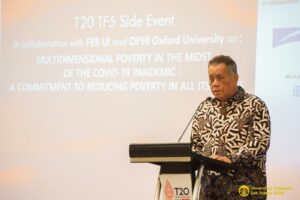
In his welcoming speech, Prof. Ari said the event aimed to bring together experts and researchers from Indonesia and Oxford to work together to create innovative solutions to address the challenges after the Covid-19 pandemic. “I hope this discussion can generate a spirit of collaboration – as the spirit of Gotong Royong is known in Indonesia – between Indonesian researchers, United Kingdom researchers, and world researchers to support sustainable development to recover Indonesia and other G20 countries from the crisis caused by the pandemic,” said Prof. Ari.
The Covid-19 pandemic has had a significant impact on people’s lives. Since the beginning of its spread, there have been disruptions in the economic sector that have hampered economic growth. Many people experienced a decrease in income and lost their jobs. The poverty rate also increased sharply. As the pandemic continues, more people are affected, and economic problems are widespread in Indonesia and the world. Therefore, monitoring and efforts to overcome poverty are necessary, as stated in the first point of the Sustainable Development Goals.
“Innovative solutions are needed to overcome the problems arising from poverty. This event’s dialogue and panel discussion will explore the multidimensional poverty index and concrete solutions to formulate the best policy for overcoming poverty problems due to the Covid-19 pandemic. We hope that through this event, relevant solutions will be found to answer the various challenges in society and restore conditions due to Covid19,” said Prof. Ari closing his speecah.
Focusing on poverty issues, the discussion was divided into six panels held in parallel. Panel 1 discussed TF5 policies that specifically address multidimensional poverty and inequality. It discussed the role of TF5 and the challenges faced in terms of social and economic aspects while implementing the policy. Panel 2 discussed business sector solutions to end multidimensional poverty. This panel highlighted the role of the private sector and entrepreneurship, especially Micro, Small, and Medium Enterprises (MSMEs), in economic development and poverty alleviation after the pandemic. It also discussed the key policies that the government needs to consider to support MSMEs.
Meanwhile, Panel 3 discussed the Multidimensional Poverty Index (MPI) if included in budget allocation policies. MPI looks at the structure of poverty more broadly, not only from income or consumption but also multidimensionally, such as limited access to education, health, and quality of life. Ten indicators are more comprehensive or fairer in measuring poverty. For Indonesia, the MPI is a breakthrough in capturing poverty conditions because it provides a more realistic picture of poverty than the consumption approach.
Panel 4 discussed social protection policies amidst the pandemic, primarily related to the development of MPI in India and Nigeria, and the challenges faced in supporting social protection policies in Indonesia. Meanwhile, the relationship between human welfare and the environment was discussed in Panel 5. The government or public sector must report on the environmental impacts of their policies. Awareness of the importance of taking environmental impacts into account can guide sustainable government policies. Through multidimensional poverty measurement, macro and microeconomic policies related to human and environmental well-being can be targeted.
In Panel 6 of this discussion, the application of multidimensional poverty measurement to look at technology-supported community vote counting was discussed. Technology and non-traditional data sources can support urban welfare monitoring during the pandemic. In this case, technology helps gather democratic voices on how best to monitor welfare during the pandemic in urban areas.
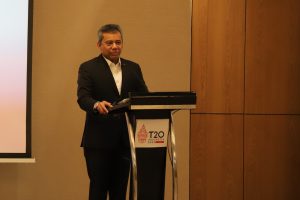
Prof. Suahasil, on that occasion, conveyed essential points in the finance track in the G20. First, the G20 is committed to using all policy instruments in managing economic performance. Not only development policy, fiscal policy, monetary policy, and labor policy, the G20 is committed to making policies that cover all instruments. “Although the Covid-19 virus is still haunting us, we believe we can get out of this pandemic,” said Prof. Suahasil.
Furthermore, the G20 agreed to increase awareness, surveillance, and preparedness for global health. Currently, the economy and health are two things that cannot be separated. Moreover, due to the pandemic, world countries have a connection between the economy and health. The G20 also pays attention to sustainable finance by always using a medium and long-term perspective in every decision-making. For example, an energy transition mechanism from coal energy to environmentally friendly renewable energy is being developed in Indonesia. However, according to Prof. Suahasil, these G20 targets can only be achieved if Indonesia and other countries have quality human resources. Therefore, the problem of poverty must be addressed seriously.
Source: UI Public Relations

